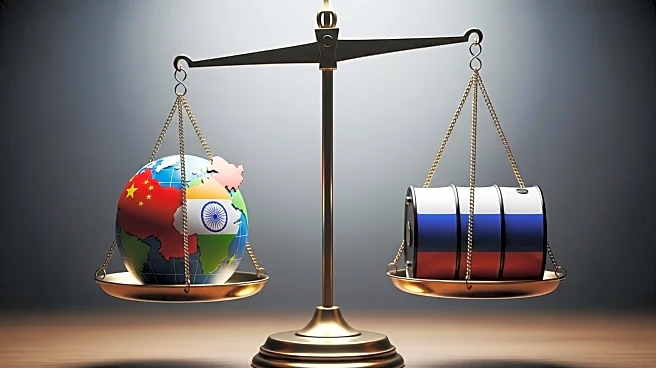What is the story about?
What's Happening?
The United States Treasury has called on its G7 and European Union partners to impose significant tariffs on imports from China and India. This move is aimed at countering their purchases of Russian oil, which the US Treasury claims are funding Russia's military efforts in Ukraine. President Trump has already imposed an additional 25% duty on Indian imports, raising the total tariffs on Indian goods to 50%. This action is intended to pressure India to cease its Russian oil acquisitions. Despite China's involvement in purchasing Russian oil, the Trump administration has refrained from imposing further tariffs on Chinese products, citing a delicate trade balance with Beijing. The US Treasury has organized an urgent G7 conference to discuss enhanced measures against Moscow, emphasizing the need for coordinated action among allies.
Why It's Important?
The US Treasury's call for tariffs highlights the geopolitical tensions surrounding the Ukraine conflict and the role of international trade in influencing political outcomes. By targeting China and India, the US aims to disrupt the financial support for Russia's military activities, potentially hastening the end of the conflict. This move could have significant implications for global trade relations, particularly between the US, China, and India. The increased tariffs on Indian imports may strain bilateral trade discussions, while the decision to maintain a sensitive trade balance with China reflects the complexity of US-China economic relations. The broader impact on global markets and diplomatic relations underscores the interconnectedness of trade and geopolitical strategies.
What's Next?
Treasury Secretary Scott Bessent is scheduled to visit Madrid to meet with Chinese Vice Premier He Lifeng. Their discussions will cover trade matters, including US demands for Chinese-owned TikTok to sell its American operations, and concerns about money laundering prevention. President Trump has expressed impatience with Russian President Vladimir Putin and is considering additional measures, such as enhanced sanctions on banking institutions and oil sectors, to pressure Russia. The US Treasury is urging European nations to join in imposing tariffs, with the promise of rescinding them once the conflict ends. The outcome of these diplomatic efforts and the response from China and India will be crucial in shaping future trade and geopolitical dynamics.
Beyond the Headlines
The US Treasury's strategy to leverage tariffs as a tool for geopolitical influence raises questions about the ethical implications of using economic measures to impact international conflicts. The potential for long-term shifts in trade policies and alliances could redefine global economic landscapes. Additionally, the focus on Russian oil purchases highlights the ongoing debate over energy dependence and its role in international security. The situation underscores the complexity of balancing economic interests with political objectives, as nations navigate the challenges of global diplomacy.















